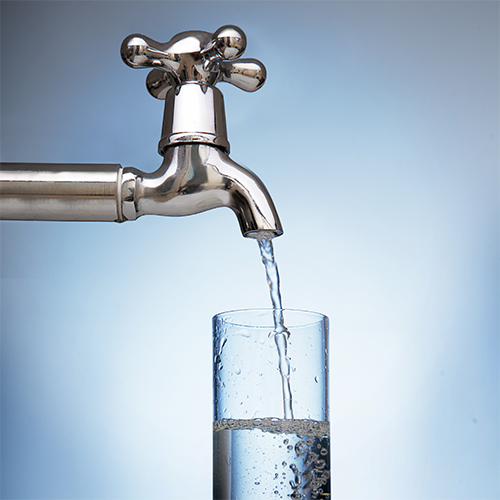Nigerians deserve potable water
In spite of the global targets set under the Millennium Development Goal (MDG) 7, Nigeria is unable, seven years after the 2015 target, to halve the greater proportion of its population without sustainable access to safe drinking water and basic sanitation. Access to clean water implies “getting water from an improved source that is accessible […]

In spite of the global targets set under the Millennium Development Goal (MDG) 7, Nigeria is unable, seven years after the 2015 target, to halve the greater proportion of its population without sustainable access to safe drinking water and basic sanitation. Access to clean water implies “getting water from an improved source that is accessible at home, available when needed, and free from faecal and chemical contamination”. This, however, remains the major bane of majority of the country’s population.
A 2022 Report by the World Bank shows that while 70 million Nigerians had no access to basic drinking water services in 2021, about 114 million were without basic sanitation facilities in the same period. The report titled, ‘Global Water Security and Sanitation Partnership’ shows that access to pipe-borne water declined from 36 per cent in 1990 to 11 per cent in 2021. According to the report, “Urban water utilities largely fail to meet the needs of their population”; forcing a majority to rely on expensive and often unsafe alternatives including private water vendors and shallow private wells.
While in charge, the British colonial administration in Nigeria did not downplay the provision of safe water. Up to the end of the first two decades after independence, Nigerian leaders at all levels of governance prioritised water. Today, it’s embarrassing that water taps are dry in most state capitals in Nigeria including Lokoja where water is naturally in abundance. To remind states of their responsibilities, the Minister of Water Resources, Engr Suleiman Adamu, recently affirmed that the ministry was not mandated to run water supply schemes for states.
Recent media reports indicate that less than 30 per cent of the residents of Lagos State, with its dense population of residents in millions has access to potable water supply. The 2022 World Bank Report further says water quality testing at a national scale revealed that over three-quarter of the population used contaminated water sources, and that nearly half used sources that were at very high risk of faecal contamination; a major cause of diarrhoea and cholera.
Besides, poor access to potable clean water has led to the proliferation of boreholes in the country; almost to a level of threat to underground water. The construction of too many boreholes is not a safe alternative to public portable water supply scheme. The rate at which boreholes are constructed must be minimised if only to avert the imminent tremor warned by experts. Increase in the number of boreholes illustrates the collective failure particularly by state governments to develop their water sector, which explains why they also failed to actualise the targets set under the UN Water for Life Decade, 2005-2015. In the second decade of the 21st century, Nigerians in remote rural communities (where there are no boreholes) still drink from the same stream or pond with animals.
Over the years, investments in water do not match the growth of the country’s population. The annual huge expenditures by state governments in tens of billions of naira in the water sector with no commensurate outcome in the public supply of potable water also reflects the deep-seated corruption in Nigeria. For example, the cost of pumping machines, pipes and other equipment are most often inflated. Procurement laws, too, are open to abuse by civil servants in the purchase of water treatment chemicals. The situation is further worsened by the consistent failure of many state governments to service their own share of agreement in the funding of counterpart projects.
Lamenting on the population’s poor access to clean portable water, the 2022 World Bank Report noted that this is in spite of the significant assistance provided by the Global Water Security and Sanitation Partnership (GWSP) to support government’s commitment to reform and build government capacity. This GWSP support is in addition to the World Bank’s $700 million Nigeria Sustainable Urban and Rural Water Supply, Sanitation and Hygiene Program-for-Results (SURWASH).
It would be recalled that in 2018, Nigeria’s WASH sector was declared to be in a state of emergency by President Muhammadu Buhari. The government subsequently launched the National Action Plan, a 13-year strategy for the revitalisation of Nigeria’s Water, Sanitation and Hygiene (WASH) sector, aimed at ensuring universal access to sustainable and safely managed WASH services by 2030.
Unless state governments improve upon their commitment to providing the population with safe drinking water, Nigerians are justified to believe that even the Sustainable Development Goal (SDG) 6 which targets “universal and equitable access to safe and affordable drinking water for all” will simply remain a mirage. Access to safe drinking water is not only a right but also a basic necessity of life. We, therefore, call on government, particularly states to increase their commitment to the basic needs of Nigerians by improving access of the population to safe drinking water.
While it’s unfortunate that safe water remains inaccessible to majority of Nigerians, we remind the people that as citizens with rights, they also have a responsibility in managing the situation. People are advised at the household level to, for their own health, treat water accessed from unsafe sources within and outside of their homes. Water is Life. Yet, only safe water is needed to stay alive.
